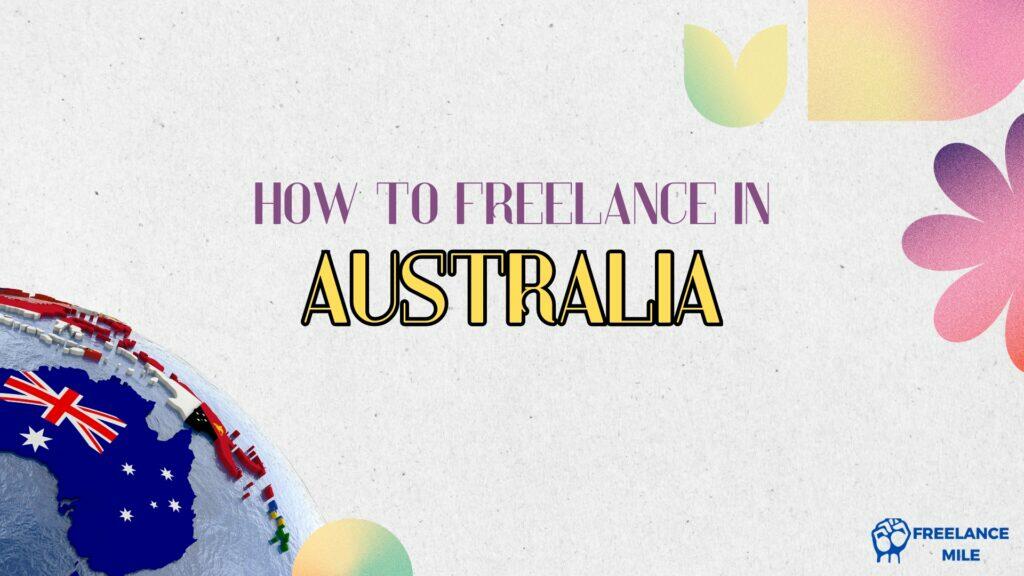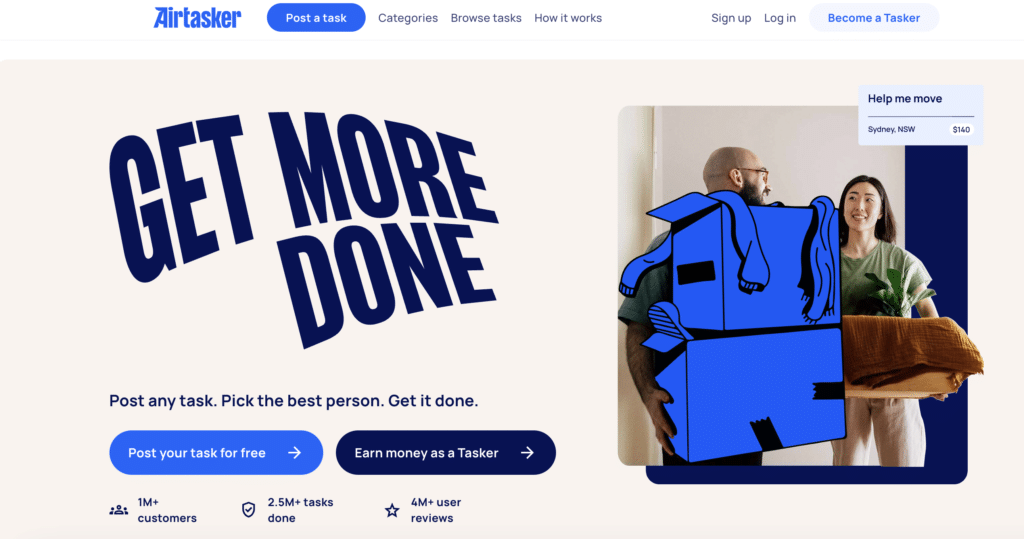To freelance in Australia, you need to identify your niche, register for an Australian Business Number (ABN), create a structured business plan, and start building your brand and online presence to attract clients. This process sets the stage for a thriving freelance career, leveraging your unique skills to offer services in demand. Additionally, utilizing platforms like Airtasker can be a valuable resource for finding various jobs and opportunities
Finding freelance work is a dynamic and rewarding way to employ your skills. Whether you’re a native Australian or an international professional considering a jump into the Australian freelancing scene, mastering the art of freelancing can afford you the flexibility and independence that a conventional 9-to-5 job may not. Grasp the ins and outs of freelancing, freelance work, and creating a sustainable freelance career as you navigate the market that’s teeming with opportunities for Australian freelancers.
For a comprehensive guide on how to freelance in Australia & a deep dive into each of these critical steps and more, follow the detailed guide below which outlines the journey of becoming a successful freelancer down under.
Key Takeaways
- Understand the essential steps to kickstart your freelancing journey in Australia.
- Recognize the importance of registering for an ABN for your freelance business.
- Learn to develop an impactful business plan and online presence.
- Discover strategies to find clients and grow your burgeoning freelance career.
- Equip yourself with the skills for managing projects and sustaining client relationships.
- Embrace the autonomy and responsibilities that come with being a successful Australian freelancer.
How to Freelance in Australia – An Overview

To freelance in Australia, you will need to obtain an Australian Business Number (ABN), which is free and easy to set up by providing some basic personal details on the ABR.gov.au website.
If you are freelancing and don’t employ anyone else, you will need to register as a ‘sole trader’. Finding work can be done through various means, such as reaching out to business connections, using websites like Airtasker, Upwork, Toptal, Freelancer, and LinkedIn, or by creating your own website and sharing it on social media.
As a freelancer, you will be liable for managing your own taxes. If you earn more than AUD 4,000 per year from your freelancing job, you are eligible for the ATO’s pay-as-you-go service, which allows you to spread your tax payments across the financial year instead of paying a lump sum at the end. You will also need to invoice your clients and keep track of your income and business-related expenses, which must be reported when you lodge your tax return at the end of the financial year.
The types of freelance jobs available in Australia include graphic design, web development, writing, consulting, and many others. There are a variety of resources and platforms available to help freelancers find work and connect with clients, such as Freelancing.com.au and LinkedIn. It is essential to continuously upskill within your industry and sharpen your tools of the craft.
Understanding What Freelancing Is
Imagine a career where you are the master of your own destiny. Freelancers enjoy a level of freedom traditional employment can’t match. Operating as an independent contractor, you engage in contract work, offering your freelance services to those who need them—free from the tether of a single employer. This autonomy allows you to make career decisions based on your unique skill set, granting you the power to shape your professional trajectory.
Evaluating the Freelancing Landscape and Market Growth
The freelance revolution is expected to continue growing, with leaders in the field expressing optimism for the future. The year 2024 is anticipated to be a net growth year for freelancing, with over 83% of freelance leaders feeling bullish about the short-term future.
Client relationships have emerged as a critical driver of performance, particularly in marketplace platforms that are increasingly targeting enterprise clients. Despite concerns about economic downturns, half of the marketplace participants feel prepared for potential recessions.
Identifying Your Freelance Niche
To truly flourish in this adaptive environment, identifying your freelance niche is imperative. Integrating your freelance services with your skills and interests lays the groundwork for a profound competitive edge. By specializing, you not only bolster your ability to deliver a refined and bespoke service but also enhance your marketability within the Australian workforce, carving out your very own freelance niche.
Setting the Foundation for Freelance Success
Embarking on the freelance path requires solid groundwork and a clear vision of your end game. By covering key essentials like obtaining an Australian Business Number and fleshing out a robust business plan, you lay the groundwork for a successful venture. Additionally, carving out an attractive digital footprint will keep your freelance business buoyant in the competitive tides of today’s market.
Registering Your Australian Business Number (ABN)
One of the first orders of business is securing your Australian Business Number (ABN), a unique identifier that allows you to work legally and streamline your taxation processes. To obtain your ABN, you must register as a sole trader on Australian Business Register. This step is more than just compliance; it demonstrates your dedication to professionalism and can increase trust with prospective clients.
Creating a Structured Business Plan
Your freelance journey demands strategic planning, particularly when it comes to developing a business plan. Think of it as your road map, highlighting your services, defining your target market, and setting achievable objectives. A comprehensive business plan should address the following:
- Business objectives and mission
- Service offerings and unique selling points
- Analysis of your target market and competitors
- Digital marketing and brand-building strategies
- Financial planning, including pricing and budgeting
Developing Your Brand and Online Presence
For a flourishing freelance business, a strong online presence is non-negotiable. It’s the beacon that attracts your target market and showcases your professional portfolio. Combine a distinctive brand identity with a sophisticated digital marketing plan to ramp up your visibility.
| Branding Element | Description | Benefits |
| Professional Portfolio | A curated collection of your work that showcases your skills and experience. | Highlights your expertise, attracting potential clients. |
| Social Media Presence | Active participation and content sharing on platforms like LinkedIn, Twitter, and Instagram. | Engages a broader audience and opens networking opportunities. |
| Personal Website | A dedicated space to present your work, share your story, and connect with clients. | Offers a centralized hub for your brand, enhancing your professional image. |
| Content Marketing | Regularly publishing valuable content related to your field. | Establishes thought leadership and keeps your audience engaged. |
| Customer Testimonials | Positive reviews from past clients. | Builds trust and credibility in your services. |
Remember, your brand is your promise to your client. It encompasses the experiences and expectations you deliver, along with the image you project. By actively managing and optimizing your brand and online presence, you place yourself firmly on the freelance map and drive your career towards success.
Finding Freelance Work and Growing Your Clientele
As you delve into the sea of freelance work, remember that finding clients is akin to planting seeds for your small business to flourish. You are your own advocate, and industry networking can be as fruitful as a well-tended garden.

In the age of digital connectivity, freelance job platforms like Airtasker, Seek and Upwork provide fertile ground for your professional growth. Let’s explore the strategies to help you navigate through the competitive terrain and elevate your client acquisition process.
You are not just selling a service; you are delivering a solution to a client’s need. Articulate this well, and you will see your clientele grow.
Active participation in industry-related networking events and online communities can open doors to valuable connections. Aptly conveying your service offerings with a persuasive pitch is crucial. To this end, consider crafting tailored proposals that showcase the unique value you bring to a potential client’s business. Below is an actionable framework to guide your client outreach:
- Build Your Network: Join industry forums and online groups where you can share insights & connect with peers and potential clients.
- Enhance Your Visibility: Attend seminars and conferences to establish your presence and engage with small business owners who may be in need of your services.
- Develop Your Pitch: Clearly communicate the unique aspects of your freelance services. Hone your verbal and written pitches to be compelling and concise.
- Leverage Job Platforms: Create standout profiles on freelance job platforms, where a plethora of opportunities await proactive freelancers.
- Refine Your Marketing Strategy: Whether through cold emails or social media marketing, ensure that your approach is robust and targeted.
Securing long-standing professional relationships requires a continuous effort. By utilizing the strategies discussed, you will not only find clients but also nurture a network that supports the sustainable growth of your freelance endeavors. Keep moving forward, for every connection made is a step towards expanding your freelance footprint.
How to freelance in Australia: Managing Projects and Clients
When you delve into the world of freelancing, mastering the trifecta of time management, client interaction, and financial discussions stands at the crux of your success. Let’s break down these pillars to ensure that your freelance journey in Australia is not only profitable but also gratifying.
Optimizing Your Workflow and Managing Time
As an architect of your own time, adopting work-from-home habits that boost productivity is vital. Crafting a work environment that’s conducive to focus, with minimal distractions, primes you for peak performance. Consider time-management systems like the Pomodoro Technique or apps like Trello to keep your projects and tasks prioritized and on track. A disciplined approach to scheduling, paired with the agility to adapt, will serve you well in delivering project deliverables efficiently.
Navigating Client Relationships and Expectations
Building a rapport with your clients is about more than just delivering good customer service; it’s about forming robust client relationships that endure. Regular and transparent communication ensures that work expectations are met & project timelines are adhered to. When challenges arise, empathetic listening and tactful negotiation can safeguard your professional relationship and keep project billing on course.
Handling Contracts and Negotiating Rates
Your freelance contracts are the backbone of your professional dealings. They outline the fee structure and terms of engagement, serving as a reference for both parties. As you navigate invoice management, it’s essential to command rates that mirror the value you provide. When negotiating, stand firm on your worth but remain open to compromise, finding a balance that reflects the project’s scope and your expertise.
- Establish a goal-oriented workspace
- Utilize digital tools for task management
- Build a routine with designated breaks to recharge
- Communicate effectively and expedite customer service
- Maintain clarity in freelance contract terms and conditions
- Handle invoice management with precision
- Discuss rates with confidence, anchored by your expertise
Remember, in the field of freelancing, your capacity to manage projects, client rapport, and your financial terms will define your trajectory. Take the reins of your freelance business with a proactive and professional approach, and the rewards will be manifold.
Conclusion and the Future of Freelance in Australia
Freelancing has become a significant part of the Australian workforce, with more than a third of workers now identifying as freelancers. This shift towards freelance work is largely driven by individuals seeking greater autonomy and flexibility in their professional lives. The freelance industry in Australia has seen remarkable growth, with a 33% increase in 2019 alone and consistent year-on-year growth thereafter. This trend is not solely based on necessity but also on the evolving preferences of the workforce.
Future Trends and Insights
Looking ahead, several trends are shaping the future of freelancing. There is a growing emphasis on expert networks, consulting 2.0, and project management services. Remote freelance work is becoming more accepted, and there is a push for professionalism within the industry. Large corporates are planning to increase their use of freelancers, with over 80% indicating this intention. Additionally, the importance of upskilling and reskilling cannot be overstated, as these could add significant value to the Australian economy.
The freelance industry is heavily influenced by technology, with a growing demand for secure and automated transaction platforms. However, there are concerns about the impact of automation on job markets, with nearly 40% of Australian jobs at risk of being automated in the next 10 to 15 years. Despite this, the adoption of AI and automation is expected to bring economic benefits, potentially adding up to $2.2 trillion to the Australian economy by 2030. Governments are generally seen as unhelpful to the freelance economy, with policies and regulations often perceived as unhelpful or neutral.
Conclusion
In conclusion, your freelance venture is a dynamic confluence of autonomy, responsibility, and growth. By embracing the challenges that come with self-employment in Australia, you commit to a course that not only demands excellence but also rewards it with professional autonomy and personal satisfaction. Forge ahead with confidence, knowing that the efforts you invest today are the building blocks for a flourishing freelance future.
FAQ
Does freelancing count as professional experience on a resume?
Yes, freelancing can count as professional experience on a resume. Freelancing allows individuals to develop a diverse range of skills and experience, which can be valuable to potential employers. When listing freelance work on a resume, it is essential to be clear about the role and responsibilities, start and end dates of the freelance opportunity, and any achievements or positive outcomes for the project
How to balance work and life as a freelancer in Australia?
Set Task Priorities: Focus on crucial tasks.
Take Care of Yourself: Prioritize health.
Establish Boundaries: Define personal and professional limits.
Encourage Honest Communication: Communicate openly about workload.
Flexibility: Be adaptable.
Self-Control: Avoid overcommitment.
Set Boundaries with Clients: Clarify expectations.
Enforce Boundaries: Maintain limits.
Mental Health Training: Seek support if needed.



